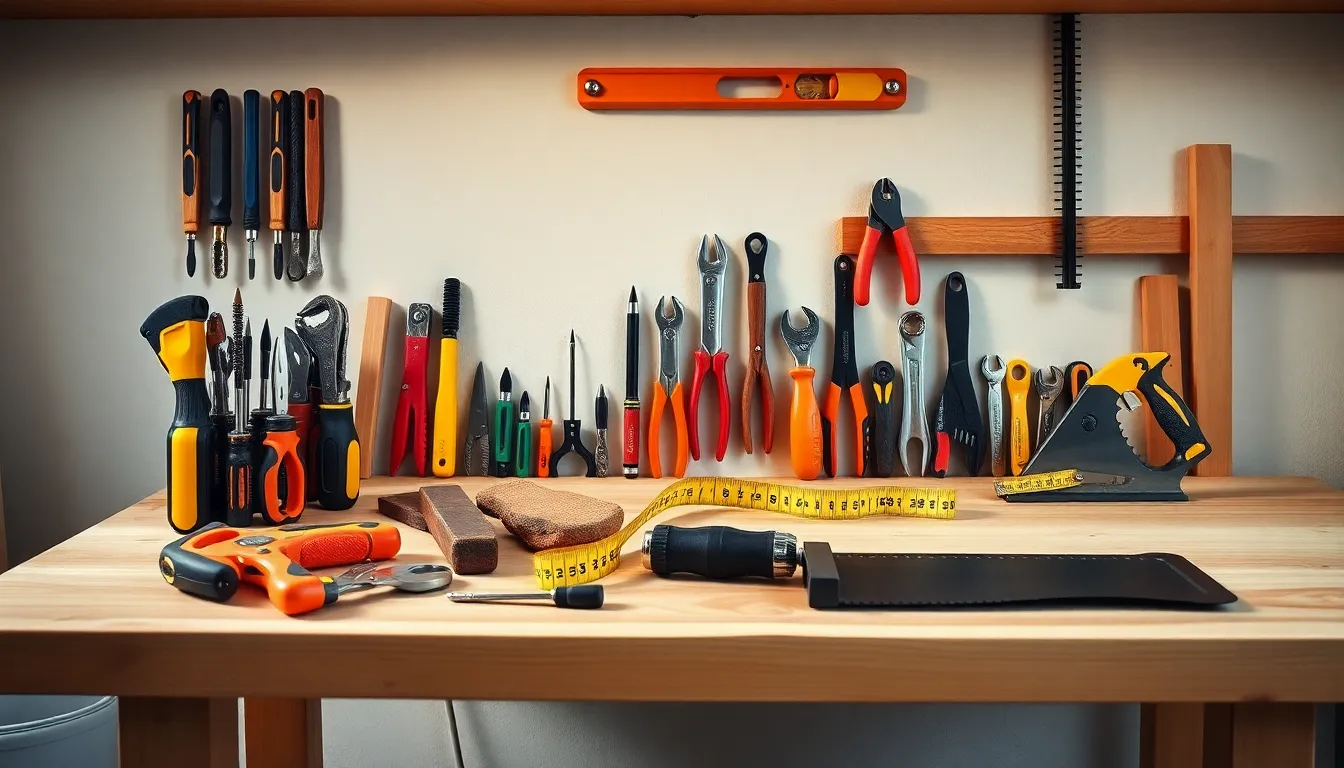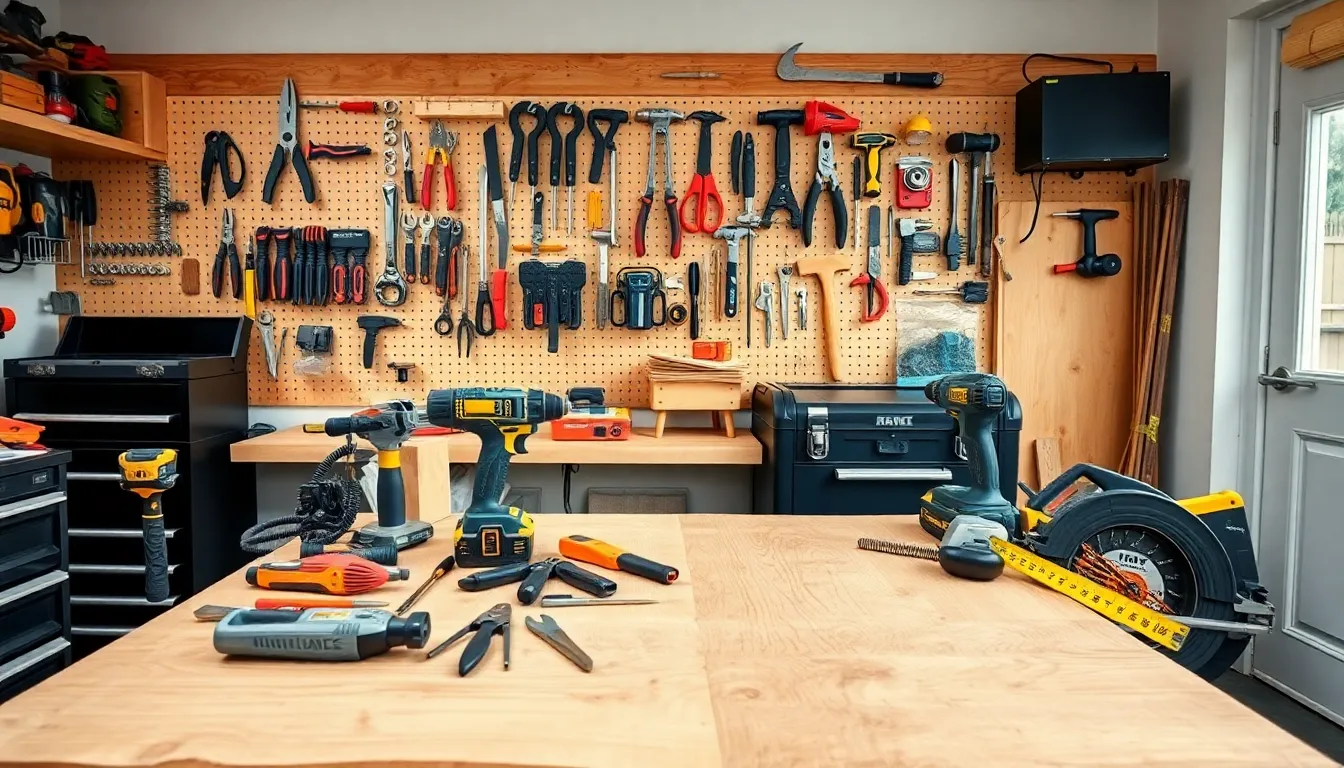Welcome to the world of DIY where a good workshop is like a magician’s hat, filled with tools that can transform the ordinary into the extraordinary. If someone ever tells you that you can’t tackle that home project because you lack the right tools, just smile and pull out this workshop tools list. We’re diving into the essentials, mixing practicality with a sprinkle of humor because, let’s face it, no one wants a workshop that looks like it exploded in a hardware store. Let’s get you equipped.
Table of Contents
ToggleEssential Hand Tools

Hand tools are often the backbone of any workshop. These trusty companions don’t require power cords or batteries, making them perfect for quicker jobs or detailed work. Here’s a list of must-have hand tools:
- Screwdrivers – A set featuring Phillips and flat-head screwdrivers is essential. Try to have at least two sizes of each.
- Hammer – When in doubt, a good hammer can solve almost any problem, just ask anyone who’s ever tried to hang a picture.
- Pliers – Various types, including needle-nose, slip-joint, and locking pliers, are crucial for gripping, twisting, and cutting.
- Wrenches – A set of adjustable and fixed wrenches will cover most of your needs, from plumbing to auto repairs.
- ** saw** – Consider investing in a hand saw for quick cuts without needing a power source. It can be therapy for some too.
- Measuring tape – This might be the most universal tool in the workshop. Measure twice, cut once, or don’t measure at all, and just practice that deep breath before making a cut.
- Utility knife – Ideal for opening boxes, trimming, and all those ‘quick fixes’ that somehow spiral into full projects.
- Level – Whether for hanging shelves or straightening pictures, a good level ensures everything is just right.
With these tools at their fingertips, anyone can tackle a wide range of projects with confidence and flair.
Power Tools for the Workshop
When it comes to tackling larger projects or achieving professional results, power tools are the game-changer. Though they can be intimidating at first, they enable quicker and more efficient work. Key power tools to consider include:
- Drill/Driver – Cordless drills are essential. They offer versatility for drilling holes and driving screws with ease.
- Circular Saw – Perfect for making straight cuts in wood, this tool saves time and effort when building projects.
- Jigsaw – For those intricate cuts, a jigsaw allows flexibility to create curves and shapes.
- Sander – Sanding can be tedious, but electric sanders streamline the process and deliver smooth finishes quickly.
- Router – A fantastic tool for shaping edges and creating decorative details, making projects look polished.
- Table Saw – While it takes some space, this powerful tool is crucial for consistent cuts and can handle larger pieces of wood.
- Miter Saw – An invaluable asset for making precise crosscuts and miter cuts, especially when dealing with framing or trims.
Power tools make workshop projects not just possible, but enjoyable. It’s like upgrading from a bicycle to a motorcycle for DIY enthusiasts.
Measuring and Layout Tools
Getting measurements right is a crucial, if not the most crucial, aspect of any project. Miscalculations can turn an ambitious vision into an embarrassing saga. Here’s what’s necessary for measuring and layout:
- T-square – This tool is ideal for ensuring right angles and can be very handy for precise cuts and layouts.
- Speed Square – A quick layout tool that helps in marking angles, especially for roofing projects.
- Chalk Line – For large projects, a chalk line allows for quick, straight lines across surfaces.
- Calipers – For the more technical jobs, calipers provide precise measurements of internal and external dimensions.
- Laser Level – This high-tech tool deserves a spot in any modern workshop. No more eyeballing things to make them level.
With the right measuring tools, achieving that perfect fit becomes a breeze, and every project is sure to be a success.
Storage and Organization Solutions
Having the right tools is just half the battle. Keeping them organized is equally important. A cluttered workshop can slow down even the most skilled artisan. Consider these storage solutions:
- Tool Chest – A sturdy tool chest keeps small hand tools organized and accessible while protecting them from wear and tear.
- Pegboard – Hanging tools on a pegboard allows for visibility and easy access while freeing up precious workbench space.
- Shelving Units – Built-in shelves can hold larger tools, boxes, or supplies and can be made durable enough to withstand the workshop environment.
- Storage Bins – Clear plastic bins labeled by tool type or project can keep everything sorted, even when the workshop gets a bit chaotic.
- Magnetic Strips – A nifty way to store metal tools like scissors or wrenches without cluttering surfaces.
With efficient storage and organization solutions, finding the right tool becomes a joy rather than a scavenger hunt.
Safety Equipment for the Workshop
Safety should always be the number one priority in any workshop. Without proper protection, accidents can easily turn what should be an enjoyable project into a trip to the ER. Essentials for safety include:
- Safety Glasses – Protect those precious eyes from flying debris.
- Hearing Protection – Especially important when using noisy power tools: earplugs or earmuffs can save hearing loss down the line.
- Dust Mask or Respirator – Essential when sanding or working with materials that emit dust or fumes.
- Work Gloves – A good pair not only protects hands but offers grip and control while handling tools.
- First Aid Kit – Always have a well-stocked first aid kit on hand. It might not prevent accidents, but it can help manage minor injuries.
By prioritizing safety, workshop enthusiasts can focus on what they love, creating and building, without unnecessary risks.
Maintenance and Repair Tools
Even the best tools require maintenance from time to time, and having the appropriate repair tools prevents headaches in the long run. Here’s a list of what should be kept nearby for such occasions:
- Lubricants – Keep things running smoothly, whether it’s a sliding mechanism on a saw or hinges on a toolbox.
- Replacement Parts – Stock some crucial replacement parts like blades and bits, as they can wear out unexpectedly.
- Screw Extractors – These nifty devices come in handy for removing broken screws without ruining the workpiece.
- Multimeter – Essential for diagnosing electrical tools, helping users determine what’s not working.
- Wrenches and Sockets – Great for keeping apparatus in tip-top shape and adjusting tight spaces.
Equipping the workshop with maintenance tools ensures projects run smoothly and keeps frustrations to a minimum.



